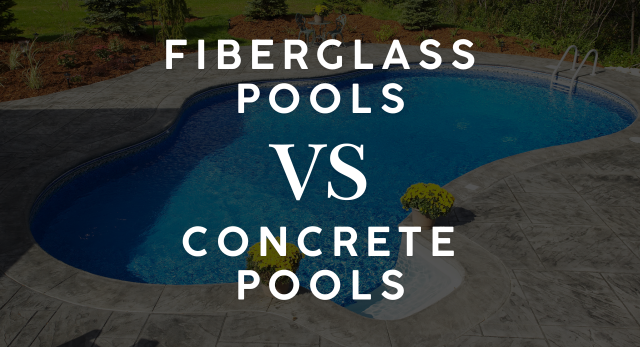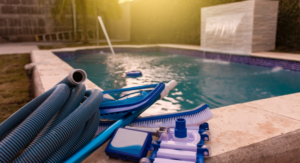Introduction
At Springhetti Pools, we believe that choosing the right pool is about finding the perfect fit for your lifestyle and family. Whether you’re looking for a beautiful backyard retreat for entertaining friends, a place for the kids to create lasting memories, or a tranquil spot to relax, we want to help you make an informed decision.
There are three main types of inground pools, but we’ll focus on the differences between concrete pools (also known as gunite pools) and fiberglass pools, the two most popular options. To guide you through the process, we’ll cover:
- Installation Time
- Cost (Initial and Lifetime)
- Customization
- Interior Surface Texture
- Durability
- Pool Maintenance
- Chemical Usage
- Hurricane Resistance (for Florida Homeowners)
Choosing Between Concrete and Fiberglass Pools
Concrete pools offer almost limitless customization options, allowing you to create unique shapes and finishes that perfectly match your vision. However, they are generally more expensive to install and maintain compared to fiberglass pools. Fiberglass pools, while less customizable in terms of shape, provide many popular upgrade options at a lower cost. These features often rival the aesthetics and functionality of a custom concrete pool, making fiberglass an attractive, budget-friendly option.
Which pool type best suits your needs? Let’s dive into the details to help you fully understand the benefits of each option.
1. Installation Time
Fiberglass Pools
Quick Installation
At Springhetti Pools, we pride ourselves on delivering a smooth, efficient pool installation process. While different pool builders may have varying timelines, our fiberglass swimming pool can be installed in as little as two weeks, depending on weather, permits, inspections, and other factors. Unlike concrete pools that can take months, our fiberglass shells arrive pre-formed, complete, and ready to be placed in the ground, allowing for faster installation and fewer disruptions to your backyard.
Our pool shells are manufactured off-site and transported directly to your property.
With ideal conditions, it takes as few as two days to dig the hole, set the pool, install the plumbing, and fill it with water. It typically takes another several weeks to complete the patio or pool deck and additional work to bring your outdoor living space to life.
Concrete Pools
Constructing a concrete pool using the gunite process can take anywhere from 3 to 6 months. This extended timeline may be worth it if the end result perfectly matches your vision for a custom pool.
Verdict
Fiberglass pools can be installed in weeks instead of months, making them a popular choice for those seeking a quicker installation timeline.
2. Cost (Initial and Lifetime)
Fiberglass Pools
Pricing
For a luxury fiberglass pool with custom features such as tanning ledges, waterfalls, pool covers, and high-end finishes, the cost can range from $150,000 and more. These costs could also fluctuate depending on the region you live in.
Long-term, your only significant maintenance expenses will be in chemicals and electricity. Maintenance will cost far less than that of a concrete pool over a 10-year period.
Concrete Pools
Pricing
For a luxury concrete pool, with unique shapes, custom features, and high-quality materials such as premium tiles and finishes, costs can range from $150,000 to $300,000 or more. Luxury concrete pools are ideal for those seeking maximum customization, but they come with a higher price tag due to the extensive labor and premium materials involved.
Concrete pools typically require acid washing, refinishing, and increased energy usage. Over the life of a concrete pool, maintenance costs are significantly higher due to the lifespan and replacement cost of the pool’s finished surface.
Verdict
The initial costs for both types are comparable for standard versions, but luxury concrete pools are significantly more expensive in the long run due to higher costs for materials and labor. Fiberglass pools tend to have a lower overall lifetime cost, making them a preferred choice for many homeowners.
3. Customization
Fiberglass Pools
Fiberglass pools generally range from 10-16 feet wide, 20-40 feet long, and can be up to 8.5 feet deep. They are created from pre-designed molds, meaning that shapes and sizes are somewhat pre-determined.
You Get What You See
The pool style you select with your dealer is exactly what you’ll receive at home—no surprises or guesswork. All fiberglass pools are manufactured in climate-controlled factories and held to high standards.
Even with size limitations, you can customize your pool’s look with water features, tanning ledges, tiles, colorful lights, finishes, and outdoor living spaces.
Concrete Pools
If you want complete control over the size and shape of your pool, concrete is the better option. It costs more per square foot, but you can design a pool to be any shape that matches your specific needs.
With concrete, you can achieve intricate designs that align with your vision, whether it’s a unique, custom shape or a more classic look.
Verdict
Fiberglass and concrete pools can both be visually appealing, but concrete pools offer far greater flexibility in terms of size and shape customization.
4. Interior Surface Texture
Fiberglass Pools
The interior surface of a fiberglass pool is crafted with gelcoat, which is smooth, comfortable to walk on, and non-abrasive if you bump against it. Steps or tanning ledges have an anti-slip texture that remains gentle to the touch.
The Big Finish
Fiberglass pools come in a variety of stunning SHIMMER finish colors, allowing you to choose a color that enhances your backyard’s appearance. To see the color options that Springhetti Pools offers, visit our color options page. The gelcoat is applied during manufacturing, giving the pool a luxurious, elegant look that sets it apart from traditional concrete finishes.
Concrete Pools
Concrete pools typically use plaster for the interior surface. Compared to the smooth gelcoat of a fiberglass pool, plaster has a rough, sandpaper-like texture that can be uncomfortable. This abrasive surface can lead to scrapes and discomfort, especially for children who may have sensitive skin. Kids playing in a concrete pool can easily end up with scrapes on their hands, feet, or knees, and swimmers often experience what is known as “pool toe.” While other finish options, such as exposed aggregate or tile, are available, they are generally more expensive, making fiberglass a more appealing choice for those looking for comfort and safety.
Verdict
Concrete pool owners would need to invest more to achieve a pool surface as smooth as fiberglass. By default, fiberglass pools offer a smooth, inviting surface.
5. Durability
Fiberglass Pools
Both the gelcoat finish and the pool structure are highly durable, making fiberglass pools ideal for a wide range of climates and for those with pets who may also use the pool.
Flexibility Matters
Our fully molded one-piece fiberglass swimming pool shells flex without cracking, accommodating ground movement better than concrete or other pre-formed pools, which may contain mineral fillers that reduce flexibility.
However, it’s essential to note that improper water chemistry can damage any pool surface, including fiberglass. Proper care is necessary to maintain the longevity of your pool, regardless of the sanitation system you use (e.g., traditional chlorine, salt chlorine generator, UV, mineral, ozone).
Concrete Pools
The structure of a concrete pool is also very durable.
Concrete pools with a basic plaster finish are resistant to damage from toys, pets, or tree branches. However, concrete pools need to be replastered every 10-15 years, including replacing the waterline tile.
Improper water chemistry can also degrade the finish prematurely, leading to costly resurfacing earlier than expected.
Using a salt chlorine generator can also shorten the life of plaster-based finishes. Saltwater doesn’t affect tile surfaces, but it can degrade the adhesive material and grout.
Verdict
Both pool types are durable, but fiberglass pools do not require periodic resurfacing like concrete pools. This is a key reason why many homeowners choose fiberglass for longevity.
6. Pool Maintenance
Fiberglass Pools
At Springhetti Pools, we understand that weekends are meant for relaxation, not scrubbing pool surfaces. Our fiberglass pools have a super-smooth gelcoat finish, which makes routine maintenance easy. Algae, dirt, and debris are less likely to stick to the surface, making brushing and vacuuming simple.
The gelcoat finish also resists stains and reduces the need for frequent chemical adjustments, allowing you to spend more time enjoying the pool. While it’s still essential to test your water chemistry weekly, maintaining a fiberglass pool is generally a straightforward task.
Concrete Pools
The surface of a concrete pool tends to attract algae, debris, and dirt due to its porous nature, particularly if it has a traditional plaster finish. Regular, rigorous brushing is necessary to keep the pool clean.
Concrete pools require the entire surface to be scrubbed weekly with a steel brush to prevent algae buildup. This hands-on maintenance can be quite time-consuming and labor-intensive.
Verdict
Fiberglass pools require less weekly maintenance than concrete pools, which need constant attention to stay clean. Ease of maintenance is a significant reason why many homeowners prefer fiberglass pools.
7. Chemical Usage
Fiberglass Pools
Barrier Reef Pools provides a thorough pool care guide that helps you understand how to take care of a fiberglass pool. You can learn more about that here: Pool Care Guide.
Compatible with Saltwater
Saltwater pools are increasingly popular for their health benefits and natural feel. Fiberglass pools are fully compatible with saltwater, provided water chemistry is properly maintained.
Weekly testing is still required, but managing a fiberglass pool’s chemistry is typically easier and less costly than concrete pools.
Concrete Pools
Concrete pool surfaces can increase the water’s alkalinity, leading to difficulties in maintaining proper pH levels. As a result, you’ll need to add muriatic acid frequently. Calcium levels must also be closely monitored—if they become too low, the calcium in the plaster will leach out, leading to premature re-plastering.
Verdict
Concrete pools tend to require more chemical usage to maintain balanced water chemistry, making fiberglass pools a more economical choice in terms of chemical needs.
8. Hurricane Resistance (for Florida Homeowners)
Fiberglass Pools
Fiberglass pools are often considered more resilient in hurricane-prone areas like Florida. Their one-piece, flexible structure allows them to better withstand ground movement and pressure changes that may occur during a hurricane. Since the shell is lightweight and sits in a reinforced hole, the risk of cracking or structural damage is minimized, provided the pool remains filled with water to counterbalance external pressure.
Concrete Pools
Concrete pools are heavy and rigid, making them more susceptible to damage from ground shifts during a hurricane. The concrete shell, while strong, does not have the same flexibility as fiberglass and may develop cracks under extreme pressure from changing ground conditions. Additionally, any flooding or rising groundwater can lead to issues with pool integrity if the pool is not adequately balanced with water inside.
Verdict
For Florida homeowners concerned about hurricanes, fiberglass pools offer better flexibility and resilience against ground movement during extreme weather events, making them a preferred choice for durability in such conditions.
Which Pool Should You Choose?
The right pool for you depends on your priorities and location. Do you want a highly customized pool with a unique shape, or are you looking for something easier to maintain? Do you prefer a faster installation or are you willing to wait for a fully customized option? Are you worried about frequent weather turbulence such as hurricanes and their aftermath? Based on your answer to these questions you’ll have a better idea of what to pursue.
Is a Concrete or Fiberglass Pool Best for You?
Concrete Pools Might Be a Good Fit for You If You:
- Need a custom shape or depth, like an L shape or 9-foot deep end
- Don’t mind spending time and/or money maintaining the pool down the road
- Are unbothered by rougher texture on your feet
Fiberglass Pools Might Be a Good Fit for You If You:
- Don’t need a pool larger than 16’x40’
- Don’t mind choosing from a variety of pre-determined shapes
- Are seeking less maintenance
- Want a pool with lower long-term costs
- Want a quicker installation
- Want a reliable pool that is built with quality materials and backed by trusted manufacturers (like Barrier Reef which we use)
- Want a smooth, non-abrasive surface that is safe for your family
- Want a pool that is available in a range of SHIMMER colors, shapes, sizes, and designs
Typically, fiberglass pools are installed faster, cost less in the long run, and are easier to maintain.
Springhetti Pools and Barrier Reef Fiberglass Pools
At Springhetti Pools, we use Barrier Reef as our manufacturer for our fiberglass pools here in Florida, serving the Central Florida area and a 60-mile radius from Orlando, FL.
Barrier Reef manufactures high-quality one-piece fiberglass swimming pools using proven gel coats and vinyl ester resins. With a greater-than-industry-standard thickness, they produce some of the strongest and most reliable pools on the market. While Barrier Reef does not provide installation services, they partner with the most trusted installers, ensuring you enjoy your pool for years to come. We are privileged to be one of these most trusted installers to help serve Floridians.
Ready to Make Your Dream Pool a Reality?
Let Springhetti Pools, LLC build the perfect swimming pool for you. To learn more about our services and to schedule a design consultation, don’t hesitate to call us at (407) 625-9844 or fill out our Contact Form. Our simple process makes working with us easy, and we’ll be with you every step of the way:
- Discovery: We begin by understanding your reasons for wanting a pool—whether it’s for family fun, exercise, or creating lasting memories at home.
- Design Selection: Choose a design that perfectly matches your preferences—from modern, straight lines to classic shapes. You can learn more about our designs by checking out the type of shapes you’re interested in and then checking each pool model in the following pages:
- Installation: Enjoy the benefits of a quick and efficient fiberglass pool installation. Our projects normally take anywhere from 2-4 weeks on average–based upon your specific needs.
Let us help you transform your backyard into a beautiful outdoor living space that you will enjoy for years to come.



